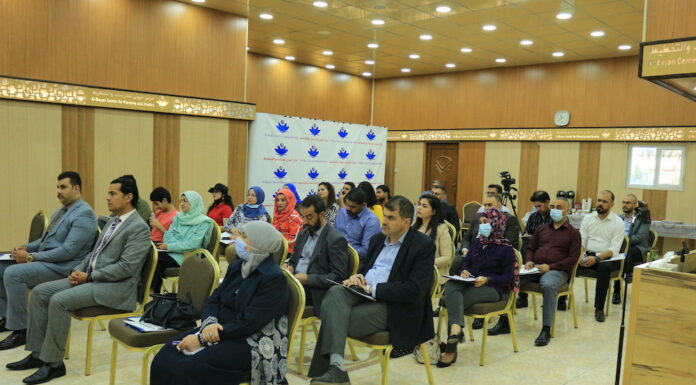Al-Bayan Center for Planning and Studies, based in the capital city of Baghdad, held a seminar entitled “early Parliamentary elections, participation options, and boycotts,” at which the Centre hosted Dr. Abdul Hussain Al-Hendawi, Adviser to the Prime Minister for Elections, Mr. Raid Fahmi, General Secretary of the Iraqi Communist Party and Mr. Dia al-Asad, member of the Sadri political bureau.
Speakers discussed options for early elections to be held next October, and what the visions and justifications for participation and boycott were.
Dr. Abdul Hussain Al-Hendawi, “Providing a secure electoral environment is a critical condition for early parliamentary elections, the Government has established a High-Security Committee for Election Security, comprising high-level officials from all relevant ministries and security agencies. In addition to the oversight role to be played by the United Nations, we have taken measures to prevent any external interference that offends the integrity of elections and the right of voters to vote in full freedom. There are procedures for political money that require the effective implementation of all legal sanctions in this regard.”
According to Mr. Dia al-Asad, “the success of the democratic process in Iraq and through the early elections is based on three main pillars: a fair electoral law. This is closely linked to the law of the parties, the form of the state we seek, and the institutions of this State, as well as a second pillar: the consciousness of the voter. This is a product of society. The candidate is therefore not free from the flaws of society. The third pillar is the quality of the voter who should have scientific and efficient thinking, not on a clan or ethnic preferences.”
Mr. Raid Fahmi also outlined the Communist Party’s vision of the conditions for elections, saying that “the holding of free and fair elections had several conditions, the first of which concerned the federal system in terms of how the elections were held, its mechanisms, the role and security of the Commission, and the inability to falsify and develop problem treatments. The other part is the electoral environment and electoral security in terms of the freedom of the voter who is supposed to go to the polls without fear, and the candidate’s freedom, which means confining arms and detecting murderers. “
LINK: https://www.bayancenter.org/2021/05/7027





